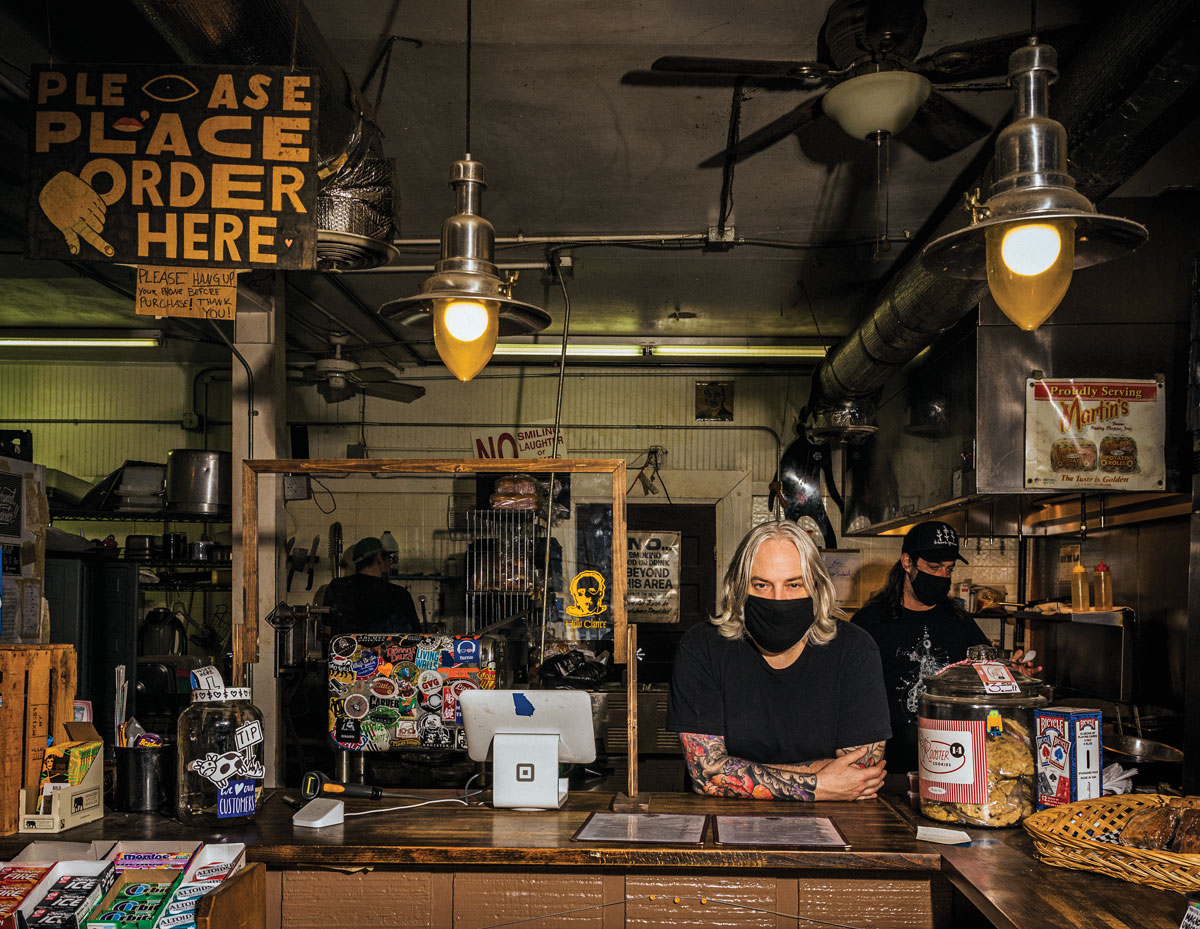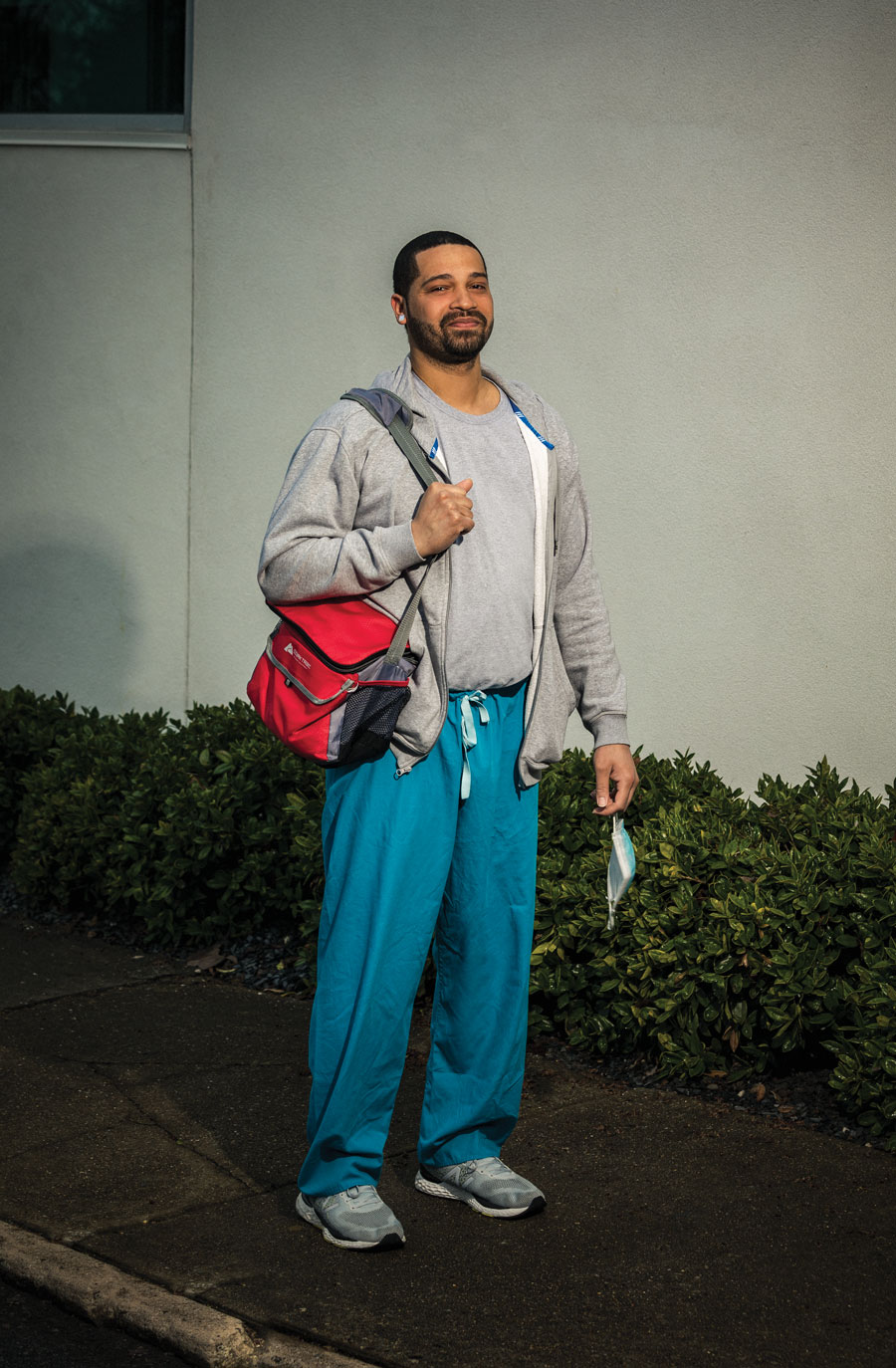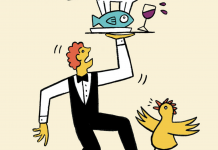
Photograph by Audra Melton
The sanitation crew member
Whitney Beauford-Morris | solid waste equipment operator II senior, City of Atlanta
The biggest change during the pandemic has been the workload. With a lot of people working from home, and with their children being at home, a lot of people are buying their food in bulk. So, with boxes and such, overall, the weight of what we pick up has been substantially heavier. I’m much more tired at the end of the day. This is a physical job, and I definitely feel it. It has been a tiresome year, so, as soon as they allowed Massage Envy to open back up, I started going back. I also have a chiropractor. I’ll occasionally take a long bath, too.
As for the precautions, not too much has changed. Just the nature of this job, whether there’s a pandemic or not, we’re dumping other people’s discarded items, so we’ve always been very conscientious about hygiene. People throw away a lot of things, and we have no idea what it is when we’re out here working. There was maybe an uptick in the fear, but I kind of understood that came with the job before the pandemic.
Even before all this, I would change out my shoes after work. My shoes never came home. Once the pandemic hit, I would make sure my clothing never came in the house either, because I have three young children. When this first started, it was an adjustment, but like most people, I didn’t think we’d be in this a year later. We at the sanitation department are part of the continuity of Atlanta. We’re that little bit of normalcy in a time where nothing is normal.
The mail carrier
Jamesa Rainey-Euler | mail carrier, United States Postal Service, Marine veteran
Georgia was unique for letter carriers because we had that election going on through January, which added a lot of pressure to the job, with the political mail—including ballots—mixed in with all the holiday mail. I was working seven days a week for about two months. We were out there in the dark, doing everything we could with a smile on our face, completely terrified that we could be infected. I just had to tell myself that I was making a difference. That’s all you can do.
It takes a toll on your family life. I’m married and a mother of five. My youngest is 13, and when I was getting home around 10 or 11 at night, after working on multiple routes, I didn’t even really get a chance to have a conversation with her. I would peek in her room, and she would already be asleep. And the next day, you turn around and do it again.
If it weren’t for my customers and the positivity I received from them, I don’t know that I would be able to do it. They’re my motivation. It’s the little things that really make a difference in a stressful situation. It’s how you make someone feel valued—stuff like just knowing my name and saying hello.
It turns out I’m stronger than I knew, and I don’t think that has anything to do with me being a Marine Corps captain. It might have everything to do with me being a breast cancer survivor and the mother of five nearly 10-pound babies. I’m honestly surprised I survived the holidays and the election. And now that I’ve got the vaccine, sometimes, when I’m out here walking my route, it just makes me giggle.
The farmer
Jon Jackson | founder, Comfort Farms, Army veteran
At the beginning, we created a real online presence for the farm, where people could shop on the web and pull up in their vehicles. We were running Chick-fil-A–style food lines. People were coming in, beeping the horn, ready to pop the trunk and go. We kept that going for a few months—and we’re still doing digital orders—but people also want to get out of their vehicles and look at the farm, be part of the farm. We see a lot of people gravitating toward being out in the open air.
We had made the decision to open a farmers market on the farm in 2016. But with the pandemic, instead of doing things like a regular farmers market, with people all crowded around each other trying to look at vegetables, we had people walking around looking at our crops as they’re growing. People still pick up their weekly boxes, but they can also walk around, and they tell us what vegetables they want, and we pick it fresh for them right there. That turned out to be an unbelievable experience where folks were actually shopping on the farm. It’s very therapeutic.
We also have a lot of veterans at the farm. The pandemic brought a lot of chaos and unknowns, which, if you have chronic PTSD, can really get a vet going. But it also forced a lot of us to be more mission-focused. In the pandemic, we understand what our mission is: Our community needs to be fed. A lot of vets who were sitting down, feeling sorry for themselves, now feel more accomplished because they can do something they were born to do, which is to serve the community again. One of the things we believe at Comfort Farms is that nothing grows in the comfort zone. The more uncomfortable you are, the more you grow.
The restaurateur

Photograph by Audra Melton
Brad Cunard | owner, Little’s Food Store
We’ll serve 1,200, 1,500 people a week, and there’s times when I feel like I’ve been at war for a year without any relief. But this pandemic taught me what I’ve always suspected: I’m tough as nails. I’ve had to be. But having to face down the fear wasn’t easy.
At the beginning, I reached out to a retired military colonel friend of mine and said, I need your help and guidance. He talked to me like I was in a real combat situation. He said, Establish your perimeter. Figure out how you want to keep the crew safe. And that’s just what we did. The goal is to keep you guys over there and us over here, as separate as possible.
I don’t play mask police as much as I did at the beginning. It was crazy. But it’s not over. The other day, I had a guy who absolutely would not put one on, and I kept saying, I need you to put a mask on, and he’d say, Well, I just need a light or some matches. There comes a point where it would be easier to just go ahead and serve them instead of kicking them out. But he’s telling me, Well, Lyft just threatened to suspend me because I won’t wear a mask, so maybe I gotta get in this habit. That’s not the kind of guy that I want in my store without a mask on.
It ain’t been easy, and I’m looking forward to not having to slap this thing on my face anymore, but I’m thrilled that this hasn’t turned into a Stephen King situation where I helped infect half of the fuckin’ state of Georgia because we slacked off.
The paramedic

Photograph by Audra Melton
Reggie McDaniel
When you pull someone into the ambulance, and you have reason to believe they have Covid, it’s like bungee-jumping. It’s like climbing up that hill and knowing you’re in for a crazy drop, and you don’t know how you’re going to feel on the way down. The pandemic is like going up that hill—the suspense. Just imagine that feeling all day long. Being in the back of the truck, it’s scary, thinking, Man, I gotta go back home to my wife and my newborn son.
I’m not in the truck anymore; I’m at the hospital now, and I feel a little more at ease. It’s stressful being in the ambulance. You never know what you’re gonna deal with. It could be an accident; it could be a gunshot wound; it could be somebody having a stroke; it could be someone having an asthma attack. And any of them could have Covid.
This has absolutely been a test—for everybody. But being a paramedic, your job is to be the most level-headed one in the room. If I freak out, how am I gonna help you? In my head, I might be thinking, Oh, my God! Oh, my God! Oh, my God! But at the same time, I gotta be like, It’s okay, even if I know it might not be. You just do what you’re trained to do: Keep it cool.
The teacher
Fazal Khan | associate professor of law, University of Georgia
My background is healthcare law and policy. Traditionally, I don’t try to teach a current events course, but since Covid is such a unique and historical event, I’ve tried to weave it into the curriculum when it’s germane.
We started offering hybrid instruction at the beginning, with half the class live, wearing masks and socially distant, and you as an instructor behind a plexiglass shield, also wearing a mask. The rest of the class would be on a video screen.
I personally found that to be a very challenging mode of teaching. If you’re there wearing a mask and can’t see the expression on people’s faces, especially if you’re lecturing and trying to gauge their comprehension, it makes it really difficult. The silver lining of Zoom—even though it was very difficult transitioning to the virtual environment—is that, now, you can see people’s faces. It was revelatory, realizing how much communication goes on nonverbally. You hear that from experts, but when you witness it this way, it really is dramatic.
I also learned something about myself during the pandemic: I moved to Atlanta from Athens a couple years ago, but it wasn’t really until Covid that I got to know my neighbors. After logging off, I’d just walk outside, go down the block, or go to the park because nothing was open, and I met my neighbors that way. It really made me realize the importance of community. For me, that’s another silver lining of Covid, getting to confirm the values that you learned as a child, knowing your neighbors, spending time outdoors with them. Those are basic things that don’t cost money but are life-affirming and make you appreciate everything you have. The little things.
The plumber
Phillip Hurley | Mr. Plumber
I hope to get the vaccine soon because we are messing with people’s waste, and Covid lives there. If you flush a toilet, and there’s something in the bowl and the person is infected, that turns it airborne.
Your sewer drain connects to another sewer drain, which connects to the whole neighborhood, and once you pull out a toilet or something, you’ve eliminated the trap; you’re getting nothing but sewer gases back there. The [SARS virus] got transferred in a high-rise, through the plumbing.
So, we have had to take extra precautions to protect ourselves and our customers. I don’t want to go into someone’s house, get sewage on me, then go to someone else’s house and track it in there. If I pick up any sewage, I’m definitely changing my uniform. I have a daughter who’s asthmatic, so I don’t want to take any of that home. We also use fresh gloves every time, fresh shoe covers, fresh masks, stuff like that. And if I’m working with something that is effluent waste, I’m putting on an N95 respirator.
At first, people wouldn’t even stay in their houses when I came in. They’d go and sit in the garage or something. That was stressful because I’m a one-on-one type of person; it can be hard to explain or diagnose a problem if you can’t talk to someone. But it seems like the stress and the anxiety are starting to tone down, which is good. Your mind is your most powerful weapon; it can either help you or hurt you.
The chef

Photograph by Audra Melton
Elodie Westover | executive chef, Full Commission
I feel appreciated by the community. I feel less appreciated by the government. It’s really disheartening listening to people talk about how much or how little my staff deserves the stimulus money or the vaccines. It’s very clear that what’s keeping our economy running are the people whom they say don’t even deserve $15 an hour. Seeing everybody who works in grocery stores, or my dishwasher, people who are taking trash out in the middle of all this, chefs, people who are cutting hair—I think our community has done really good about showing their appreciation. So, I’m very thankful, but I think the system as a whole could really care less. They aren’t willing to admit how important people in the service industry are.
The crisis has been really anxiety-inducing. I definitely feel that restaurant people have proven with this pandemic that we’re essential because life never stopped for us. It’s kind of scary for us, and we’ve been criticized by everyone. There are people who are saying we should stay home and that we’re being unsafe. But we still have bills to pay, and I have staff that have children. We’re very thankful that we’re a neighborhood spot, and we have regulars who have been supergrateful and supercompliant with the safety protocols.
I think it really occurs to me now that I am a good leader. I’ve always struggled with the imposter syndrome that is inherent when you are a woman or queer or nonbinary and so many things—just being used to having to work so much harder than the men around me to get noticed. It’s been better at my restaurant anyway because it’s majority female on my staff. But this year, I just realized that I am very capable at leading and guiding people, and that people are very willing to put their trust in me, and that they feel supported. It’s really inspiring to see my staff be grateful and hardworking and reciprocate the good will that we have. It feels like we’re a family and have each other’s backs.
This article appears in our May 2021 issue.















